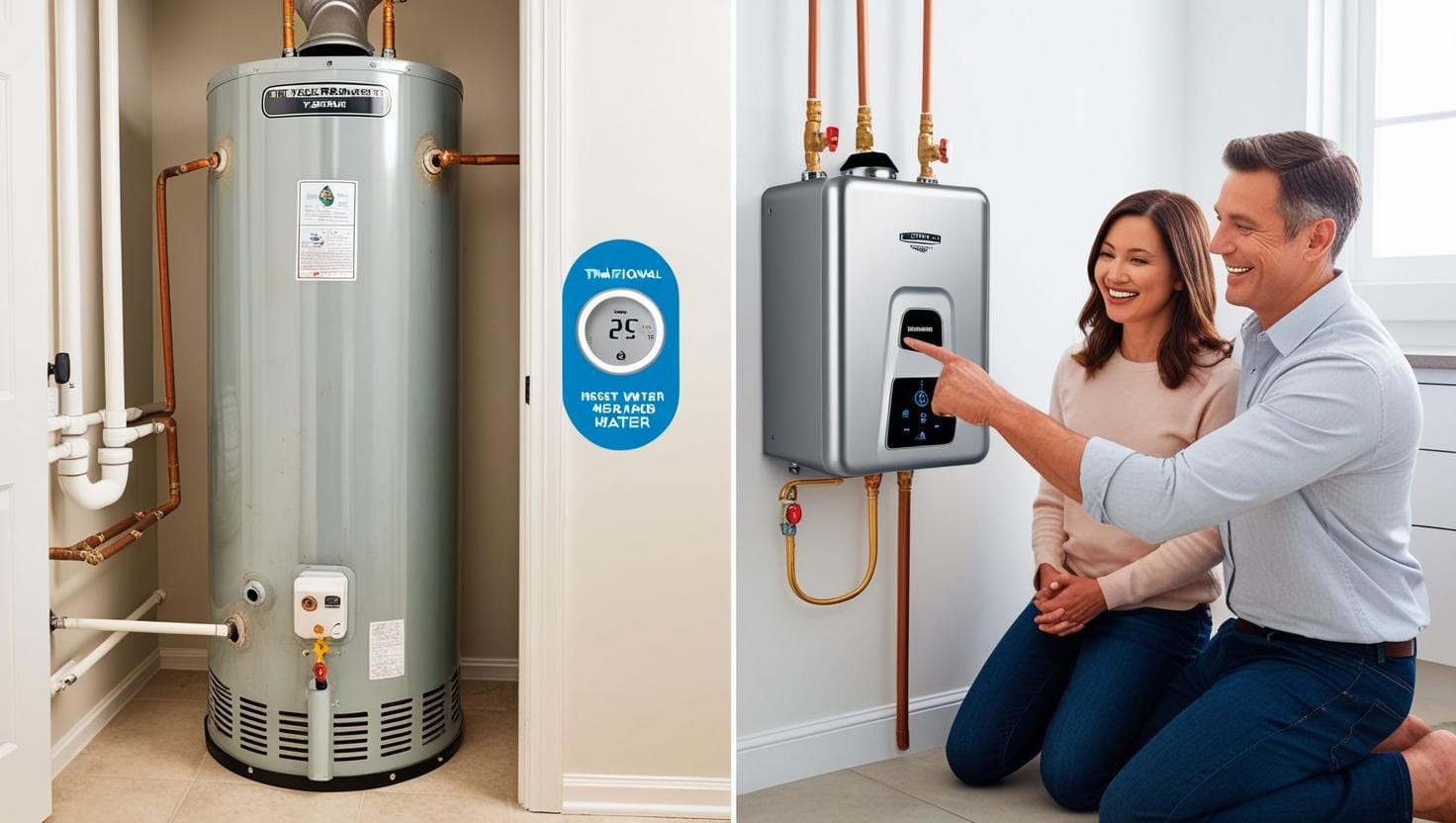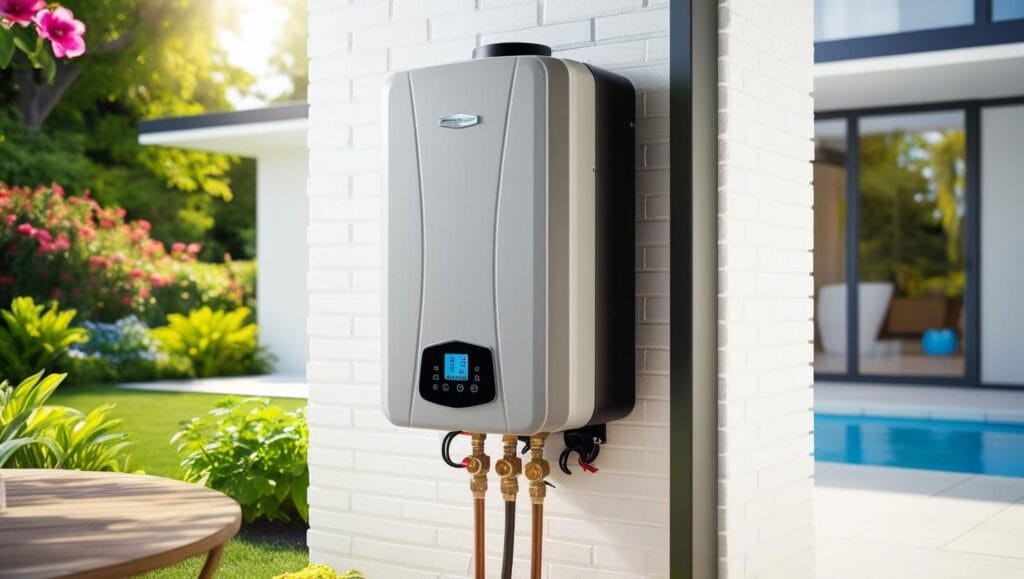Instant electric water heaters, also known as tankless or on-demand water heaters, have gained popularity in recent years due to their ability to provide hot water almost instantly. Unlike traditional water heaters that store and continuously heat a large volume of water, instant electric heaters heat water only when you need it. This not only saves energy but also ensures that you never run out of hot water, no matter how long your shower lasts.
The concept of instant hot water is particularly appealing to homeowners who are tired of waiting for their water to heat up or dealing with the inefficiencies of traditional tank-based systems. However, before making the switch, it’s essential to understand how these devices work, their pros and cons, and whether they’re suitable for your specific needs.
How can I use an instant electric water heater?
Simply turn on the hot water tap to use an instant electric water heater. Cold water flows through the unit, heating it instantly by an electric element. Adjust the temperature as needed. Ensure proper installation, and regular maintenance, and check your home’s electrical capacity to handle the heater’s power requirements.

How Do Instant Electric Water Heaters Work?
Instant electric water heaters operate on a simple yet efficient principle. When you turn on a hot water tap, cold water flows through the unit, where it is heated by an electric element. The water is then delivered to your faucet or showerhead at the desired temperature, all within a matter of seconds.
The key component of an instant electric water heater is the heating element, which is typically made of copper or stainless steel. These materials are highly conductive and resistant to corrosion, ensuring that the heater can withstand high temperatures and prolonged use.
One of the main advantages of this system is that it eliminates the need for a storage tank, which is a significant source of energy loss in traditional water heaters. By heating water on demand, instant electric heaters can reduce energy consumption and lower your utility bills.
Types of Instant Electric Water Heaters
There are two primary types of instant electric water heaters: tankless electric water heaters and point-of-use electric water heaters. Both come in different sets of features and benefits for specific use cases.
Tankless Electric Water Heaters
Tankless electric water heaters are designed to provide hot water to your entire home. They are typically installed at a central location, such as your basement or utility room, and are connected to your home’s main water supply. When you turn on a hot water tap, the unit heats the water as it passes through, delivering it to the desired location.
Tankless electric water heaters are ideal for households with moderate to high hot water demand. They can supply hot water to multiple fixtures simultaneously, making them a convenient option for families.
Point-of-Use Electric Water Heaters
Point-of-use electric water heaters are smaller units that are installed near the specific fixture where hot water is needed, such as under a sink or near a shower. These heaters are designed to provide hot water to a single fixture, eliminating the need for long pipe runs and reducing the wait time for hot water.
Point-of-use heaters are particularly useful in homes where the distance between the water heater and the fixture is significant, as they can reduce water waste and energy loss associated with long pipe runs.
Benefits of Instant Electric Water Heaters
Instant electric water heaters offer several advantages over traditional tank-based systems. Below are some of the important advantages:
Energy Efficiency
One of the most significant advantages of instant electric water heaters is their energy efficiency. Traditional water heaters continuously heat and reheat water in a storage tank, leading to significant energy loss. In contrast, instant electric heaters only heat water when you need it, reducing energy consumption and lowering your utility bills.
Space-Saving Design
Instant electric water heaters are compact and can be installed in tight spaces, such as under a sink or in a closet. This makes them an excellent option for homes with limited space, such as apartments or small houses.
Unlimited Hot Water Supply
With an instant electric water heater, you’ll never run out of hot water. Since the unit heats water on demand, you can enjoy a continuous supply of hot water, even during peak usage times.
Reduced Wait Time
Traditional water heaters can take several minutes to deliver hot water to your faucet, especially if the fixture is far from the heater. Instant electric heaters, on the other hand, provide hot water almost instantly, reducing wait time and water waste.
Drawbacks of Instant Electric Water Heaters
While instant electric water heaters offer numerous benefits, they also have some drawbacks that you should consider before making a purchase.
Higher Initial Cost
Instant electric water heaters tend to have a higher upfront cost compared to traditional tank-based systems. The cost of the unit itself, along with installation expenses, can be a significant investment.
Limited Flow Rate
One of the main limitations of instant electric water heaters is their flow rate. These units can only heat a certain amount of water at a time, which may not be sufficient for households with high hot water demand. If multiple fixtures are used simultaneously, the flow rate may be compromised, leading to a drop in water temperature.
Electrical Requirements
Instant electric water heaters require a significant amount of electrical power to operate. If your home’s electrical system is not equipped to handle the additional load, you may need to upgrade your electrical panel, which can add to the overall cost.
Factors to Consider Before Buying an Instant Electric Water Heater
Before purchasing an instant electric water heater, there are several factors you should consider to ensure that it’s the right choice for your home.
Household Size and Water Usage
The size of your household and your hot water usage patterns will play a significant role in determining whether an instant electric water heater is suitable for your needs. Larger households with high hot water demand may require a unit with a higher flow rate or multiple point-of-use heaters.
Climate and Groundwater Temperature
The temperature of the groundwater in your area can affect the performance of an instant electric water heater. In colder climates, the unit may need to work harder to heat the water, which can impact its efficiency and flow rate.
Electrical Capacity of Your Home
As mentioned earlier, instant electric water heaters require a significant amount of electrical power. Before purchasing a unit, it’s essential to ensure that your home’s electrical system can handle the additional load. If necessary, you may need to upgrade your electrical panel.
Installation Costs and Requirements
The installation of an instant electric water heater can be more complex than that of a traditional tank-based system. Depending on the unit you choose, you may need to hire a professional plumber or electrician, which can add to the overall cost.
Comparing Instant Electric Water Heaters to Traditional Water Heaters

When deciding between an instant electric water heater and a traditional tank-based system, it’s essential to understand the key differences between the two.
Tank vs. Tankless: Key Differences
The most significant difference between the two types of water heaters is the presence of a storage tank. Traditional water heaters store and continuously heat a large volume of water, while instant electric heaters heat water on demand.
Energy Consumption and Cost Savings
Instant electric water heaters are generally more energy-efficient than traditional tank-based systems, as they only heat water when needed. This can result in significant cost savings over time, especially for households with low to moderate hot water demand.
Longevity and Maintenance
Instant electric water heaters tend to have a longer lifespan than traditional tank-based systems, as they are less prone to corrosion and sediment buildup. However, they may require more frequent maintenance, such as descaling and cleaning, to ensure optimal performance.
Installation Process of Instant Electric Water Heaters
The installation process for an instant electric water heater can vary depending on the type of unit and your home’s existing plumbing and electrical systems.
DIY vs. Professional Installation
While some homeowners may be tempted to install an instant electric water heater themselves, it’s generally recommended to hire a professional. Installation mistakes can cause performance issues, safety issues, and void warranties.
Common Installation Challenges
Some of the common challenges associated with installing an instant electric water heater include ensuring proper electrical wiring, venting (if applicable), and connecting the unit to your home’s plumbing system. A professional installer will have the expertise to address these challenges and ensure that the unit is installed correctly.
Maintenance Tips for Instant Electric Water Heaters
Proper maintenance is essential to ensure the longevity and optimal performance of your instant electric water heater.
Regular Cleaning and Descaling
Over time, mineral deposits can build up inside the unit, reducing its efficiency and potentially causing damage. Regular cleaning and descaling can help prevent this issue and extend the life of your heater.
Checking for Electrical Issues
Since instant electric water heaters rely on electricity to function, it’s essential to regularly check for any electrical issues, such as loose connections or faulty wiring. If you notice any problems, it’s best to contact a professional electrician.
Replacing Worn-Out Parts
Like any appliance, instant electric water heaters may require occasional part replacements, such as heating elements or thermostats. Regular inspections can help identify worn-out parts before they cause significant issues.
Top Brands and Models of Instant Electric Water Heaters
When it comes to choosing an instant electric water heater, there are several top brands and models to consider. Here are a few options that have received positive reviews from homeowners:
Stiebel Eltron: Features and Reviews
Stiebel Eltron is a German-based company known for its high-quality tankless electric water heaters. Their units are designed with advanced features such as digital temperature control, self-modulating technology, and a compact design. Stiebel Eltron heaters are praised for their reliability, energy efficiency, and durability. Popular models like the Tempra Plus series are ideal for households looking for consistent hot water with minimal energy consumption.
Key Features:
- Digital temperature display
- Advanced flow control
- Durable copper heating elements
- Compact and space-saving design
Customer Reviews:
Customers appreciate the consistent performance and energy savings offered by Stiebel Eltron heaters. Many users have reported significant reductions in their energy bills after switching to these units.
Rheem: Features and Reviews
Rheem is a well-known brand in the water heating industry, offering a wide range of tankless electric water heaters suitable for both residential and commercial use. Their Performance Platinum series is particularly popular for its high flow rates and energy-efficient operation. Rheem’s units are designed to handle the hot water demands of larger households, making them a reliable choice for families.
Key Features:
- Self-modulating technology for energy efficiency
- High flow rates for multiple fixtures
- Durable stainless steel heating elements
- Easy-to-use digital controls
Customer Reviews:
Rheem’s tankless electric water heaters are highly rated for their performance and durability. Customers have noted that these units provide a steady supply of hot water, even during peak usage times.
EcoSmart: Features and Reviews
EcoSmart is a leading brand in the tankless water heater market, specializing in energy-efficient and eco-friendly solutions. Their ECO series is designed for households looking to reduce their carbon footprint while enjoying unlimited hot water. EcoSmart heaters are compact, easy to install, and come with advanced self-modulating technology to adjust energy usage based on demand.
Key Features:
- Self-modulating technology for optimal energy use
- Compact and lightweight design
- Digital temperature control
- Suitable for small to medium-sized households
Customer Reviews:
EcoSmart heaters are praised for their affordability and energy efficiency. Many users have reported significant savings on their energy bills, along with reliable hot water delivery.
Frequently Asked Questions (FAQs)
How long do instant electric water heaters last?
Instant electric water heaters typically have a lifespan of 10-15 years, depending on the quality of the unit and how well it is maintained.
Can I install an instant electric water heater myself?
While it’s possible to install an instant electric water heater yourself, it’s generally recommended to hire a professional to ensure proper installation and avoid potential safety hazards.
Are instant electric water heaters safe?
Yes, instant electric water heaters are safe when installed and maintained correctly. However, it’s essential to follow the manufacturer’s guidelines and have the unit inspected regularly to ensure safe operation.
What is the average cost of an instant electric water heater?
The cost of an instant electric water heater can vary widely depending on the brand, model, and installation requirements. On average, you should pay around 500 and 1,500 for the unit, with additional costs for installation.
Conclusion: Is an Instant Electric Water Heater Right for Your Home?
Instant electric water heaters offer a convenient and energy-efficient solution for providing hot water on demand. With their compact design, unlimited hot water supply, and reduced wait time, they can be an excellent choice for many households. However, it’s essential to consider factors such as your home’s electrical capacity, hot water usage patterns, and installation costs before making a decision.
If you’re looking to upgrade your home’s water heating system and value energy efficiency and convenience, an instant electric water heater may be the perfect solution. On the other hand, if you have a large household with high hot water demand, you may need to explore other options or consider multiple point-of-use heaters.
Ultimately, the decision to invest in an instant electric water heater will depend on your specific needs and circumstances. By carefully evaluating the pros and cons and consulting with a professional, you can make an informed choice that will provide you with reliable hot water for years to come.
References and External Links
For further reading and to explore more about instant electric water heaters, check out these resources:
- U.S. Department of Energy – Tankless Water Heaters
- Consumer Reports – Best Tankless Water Heaters
- Stiebel Eltron Official Website
- Rheem Tankless Water Heaters
- EcoSmart Tankless Water Heaters



